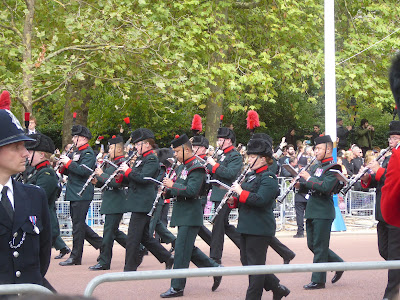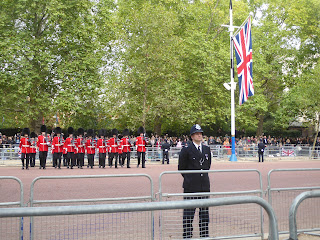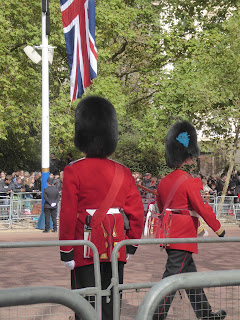And so it’s farewell, to a classy individual who caused people to dress up, stand and march in straight lines, and brought us together in unity, while exhorting us with old-fashioned values. I speak, of course, of the recent death of my high school band director, Bill Scott.
 |
| Clarinets, state funeral procession, 19 September 2022 |
Mr. Scott preached “class,” a word that sounded old-fashioned even at the time, especially in America. “Show some class,” he would urge us at a band competition. Other bands lacked class because they went around with their jackets unbuttoned, but also because they failed to applaud other bands. When we won the band equivalent of a sportsmanship medal, we knew that made him prouder than any of the other awards we received.
Being high school students, we made fun of Mr. Scott a lot, but we admired him too. Authority figures are complicated. They speak to us from another generation and of course, we think we know better in the new. Jeanette Winterson, in her reflection on the death of Queen Elizabeth II, writes “The wrecking ball of revolution, big or small, smashes what we have loved, as well as clearing the way for something new. New doesn’t always mean better – as the exhausting disruption and acceleration of our own times makes clear.”
Winterson also mentions that many in Britain and beyond would call themselves republicans, meaning they would prefer an elected head of state to a monarch. One of my republican (in this sense) friends acknowledged that a lot of people were saddened by the death of the Queen, but her heart went out to everyone who was saddened by the loss of anyone. I’ve heard a lot of people say, and I also feel, that we’re surprised how much we’ve been affected by this death of someone we didn’t know personally. Because it’s not just about one person, but about a different generation, the values those people represent, and all that we have lost.
Goodness knows, as a world, we’ve had a lot of loss in the past few years. Early in 2020 we visited our friend Margaret, who had lived across the road since the 1950s, until failing health forced her to move. She and her husband, Fred, were married on the same day as then-Princess Elizabeth and Prince Philip, and they received a Diamond Anniversary card from the Queen.
That visit to Margaret turned out to be our last. I saw her daughter on our road, gathering some things from the house she’d been born in, and she mentioned that the government was soon going to order us to stay home, because of the pandemic. Shortly after the first lockdown began, we lost Margaret. Her death was not caused by COVID-19, but our inability to see her was.
As was our inability to celebrate her life. Like so many other families, our neighbor’s were not allowed to have the funeral gathering they would have wished. Our road is a friendly place and many longtime residents wanted to say goodbye to Margaret. On the morning of her funeral, her family arranged for the hearse to pass slowly down the street, past the house where she’d lived with Fred until just a few years ago. We, the neighbors, lined up to pay our respects to a good woman and a long life.
 |
| Arms reversed in mourning |
I thought of Margaret when I saw the long and growing queue to visit the Queen’s coffin lying in state. The BBC broadcast a continuous live stream of this event, and I was hardly able to take my eyes off it. There is something deeply human about wanting to connect with other people, and the opportunity to do so in such an old, ritual form is rare these days.
 |
| On the Mall |
I heard about Mr. Scott’s death from another country, shared only in comments from fellow band members I have not seen in decades. I know that he—like Queen Elizabeth, like Margaret—was preceded in death by his spouse. So was my paternal grandmother. For their golden wedding anniversary, she and my grandfather (who, like many in my family, served in the Second World War) had the gift of a trip to England, Wales, and Scotland. In her journal Grandma wrote of one occasion when Grandpa raised eyebrows at her singing along to the national anthem, “God Save The Queen.” “She’s a nice lady,” was Grandma’s comment. “Why not?”
Nice ladies. Grandma, Margaret, and the Queen. It’s an old-fashioned word, “lady,” another that Mr. Scott would have used. “Behave like ladies and gentlemen,” he might have said. How dated! Yet as the people queued past Queen Elizabeth’s coffin—hour after hour, filing through the oldest part of the complex that houses the British Parliament—I got a different perspective on dated. “Old” might mean ninety years, or it might mean a thousand years, the age of Westminster Hall.
 |
| Security, done unobtrusively and/or with class! |
One member of the public, interviewed in the queue, said he knew “everyone on Twitter thinks we’re all nutters.” Yet another sign that Twitter is not real life. Sitting at a keyboard expressing an opinion, as I am, is not doing something. I can’t defeat Putin from here, although it’s fashionable to imagine fighting fascists is something one can do in a Tweet.
Still, we can’t resist offering our opinion, and some on Twitter at least were offering theirs politely. “This is a country I don’t recognize,” one wrote. Who are these people, wearing black and standing in line for hours to genuflect to someone “they deeply believe is better than them”?
Well, they are thousands, tens of thousands, of your compatriots and people from other countries too. So it’s worth asking who they are, and not just rhetorically. Spend any time watching the live stream and you would soon see that the full range of age, race, disability, and indeed dress was represented. From jeans and T-shirts to uniforms of saluting officers, whose service was to the Queen. There were people crossing themselves. There were skullcaps. There were turbans and headscarves.
 |
| And kilts |
I can’t speak for why they were all there or whether they believed Elizabeth II was a better person than they were. What does “better” mean, anyway? I presume the objection is to the old-fashioned notion of “your betters,” people whose status is above you and therefore, to whom you should bow. Some bowing and curtseying went on, and some tears. Many people seemed only to want a moment to stand, in quiet reflection. My instinct when Margaret’s hearse went down the street was to raise my fist in salute, but I wouldn't do that at the Queen’s coffin.
Car containing Prince George, Princess Charlotte, and their mother, the Princess of Wales
Perhaps they were there for the quiet. Occasionally a baby cried, and there was, every twenty minutes, a gentle tapping to indicate it was time for the changing of the guard. But it was otherwise silent in Westminster Hall, and no one was there to disrupt it. Even the most solemn observances outside, in public places, weren’t that quiet. There was spontaneous applause, shouting (some, but not all, respectful), singing of “God Save The King.” Outside, with no queue, you could go along just to see what was going on if you wanted to.
And of course, take a picture.
 |
| Is it just me, or does it look like our Guard stuck his finger in the light socket? |
Every other event surrounding the Queen’s passing was pictured with a crowd of people holding their mobile phones aloft. It could be pretty, like the effect of holding up lighters at a concert, but everyone was trying to capture their individual moment with the Queen, the King, the princes. Inside Westminster Hall, you couldn't take pictures. The room is a thousand years old, and people were behaving, more or less, the way they would have behaved a thousand years ago on a similar occasion.
We live in an era when everything is photographed. When something hasn’t happened unless it’s documented on a phone. I tried to think of places in the world, occasions, where people had been this quiet and respectful and no one was taking selfies. The only ones I could think of were those associated with death.
People usually behave this way in church, too, but attendance at religious services is part of far fewer people’s regular lives than used to be the case. They may only have attended weddings or funerals. At the lying in state there was a solemnity, a sense of the sacred, that may only happen on a few occasions in many contemporary people’s lives.
I imagine that, for many attending the lying in state as well as for me, there was also the sense of being part of a collective experience, of a moment that had not come for over seventy years and—at least in terms of a Queen—will not come again in our lifetimes. Other people have pointed out that the world, and even the business of Britain, did not stop because of this moment and that a lengthy period of public mourning was perhaps a distraction. For a Ukrainian, or indeed a British family struggling to pay daily living expenses, all this pageantry might seem far removed from a more urgent situation.
All that is true. And yet when I think about the Queen, and Margaret, and my Grandma, and Mr. Scott, I think about what they represented. Ladies and gentlemen, duty and class. Which, as it turns out, I miss when they are gone.
Late in the Queen’s life came the funeral of Prince Philip, who died in 2021. Many remarked on the sad spectacle of the Queen sitting alone, masked, at the funeral of her spouse of seven decades, which was the duty of everyone in Britain at that time. It has since emerged that members of the government that ordered those sacrifices were ignoring the rules themselves, partying away, in one instance the very eve of that funeral. But it was Her Majesty’s government, and she did her duty, setting an example for everyone else. Who looks “better” in this case: the hereditary monarch, making the same personal sacrifice as so many ordinary people did, or elected politicians and their cronies showing only contempt for the people who trusted them with extraordinary power over our lives?
 |
| Representatives of armed forces from across the Commonwealth |
One of the articles I read immediately following the Queen’s death described the massive changes that had taken place in society over the long decades of her reign. In the 1950s, status still depended on class, which in Britain means upper class, working class, etc. Whereas now, status means wealth or celebrity. It was a factual description, not commentary, but I immediately wondered which one was better. The Queen was not a celebrity, she never gave an interview; but in our day one can be a celebrity just for having a big arse. Or being on a reality television show, a work of fiction that elevates to the real presidency.
Of course an elected leader can be revered: the last state funeral in this country was for Winston Churchill. And the black mourning veils on the princesses reminded me of Jacqueline Kennedy, mourning the death of her husband in drastically different circumstances. But in my own lifetime, I can’t think of any president or prime minister whose coffin I’d line up to see—even the ones I voted for. (Nor would I dance on the grave of any human being, but that’s another story).
 |
| Blues and Royals with horse |
Another of the memories people kept mentioning about the Queen was how, from her and her husband’s own isolation in Windsor Castle in 2020, she spoke directly to us about the challenge of the pandemic. It was during that first lockdown period, the hardest time, when death counts were daily headline news and vaccines barely dreamt of. This elderly, unelected head of state looked into the camera and evoked the wartime anthem “We’ll Meet Again” to encourage us in our separation from one another. Only someone from the Greatest Generation could have done that, with any authenticity. By contrast, the then-prime minister stood up daily and tried to make Churchill-like sounds, but nobody was fooled by them. People elected him, but he was just another politician. The queen had been through thirteen prime ministers before him, the first one Churchill himself.
If the events surrounding the death of the Queen showed us nothing else, it’s that she and Vera Lynn were right: we met again. Not everyone, of course. Not our friends who died during the pandemic. COVID-19 is not over, it may never be over; but case numbers are lower in Britain than they’ve been since October 2021, and people are meeting again. In Westminster Hall, and outside, large crowds gathered, the government no longer forbidding them to do so. We can gather in our churches or our gardens or in the streets, like we did during the Queen’s Platinum Jubilee, just a few months ago.
The whole notion of reverence is old-fashioned, as is obedience (to laws, even when one doesn’t agree with them), and faith, and the belief that one is on earth to serve others, and God. The Christian faith is full of reverence for God as King, and this old-fashioned language has been changed, because it’s thought people can’t relate to a king these days. Modern people aren’t supposed to believe anyone is better than we are. Equality means “leveling up,” whatever the Conservative government meant by that.
The idea that someone is “better” than us seems so offensive—until we think of someone, or at least some action, that seems beyond what we can do ourselves. Someone we aspire to be. Perhaps only God is really better, and that belief, to many, is old-fashioned too. The ambivalence I have about monarchy—the absurdity that Charles Windsor should now be our King, in the twenty-first century—is not unlike my belief in God, or for that matter in “ladies” or “showing some class.” There are some problems with all of these, but if we get rid of them, what are we left with?
By all accounts, Queen Elizabeth genuinely thought that her life was meant for service, to God and her country; this whole essay is starting to sound like the Scout oath or law. No one does something, however bizarre, for seventy years without genuinely believing in it. To me personally, the Queen didn’t represent royalty so much as just that generation of my grandparents, who did their duty by serving their country in World War II, and made real sacrifices in their lives. The Great Depression, or just staying married for all those decades. We have heard, almost on a loop, Princess Elizabeth’s pledge to her people on her twenty-first birthday: “I declare before you all that my whole life, whether it be long or short, shall be devoted to your service…”
But many people her age made vows at the age of twenty and stuck with them to the end of their very long lives.
Since the Queen’s and Margaret’s generation, people have increasingly quit marriages. We’re positively encouraged to quit jobs. But the Queen never quit. A lifetime commitment inspires awe in me because it’s something I can never do. And when we can only aspire to something, what’s wrong with calling that better?
 |
| The procession was led by the Mounties. |
 |
| Royal Canadian Mounted Police |
It’s a funny relationship we have, the British monarchy and I. I grew up enthralled with U.S. history, disappointed to learn that my own ancestors had been Tories, Crown loyalists, who left America for Canada. But then I went and did the same, working for the Canadian Forces (of which the Queen was commander-in-chief) and, in my citizenship oath, pledging my loyalty to the Queen of Canada, “her heirs and successors.” People who are born British subjects or citizens of the Commonwealth never have to make that pledge, unless they are police officers, or members of the armed services.
On Monday morning, we were out in the crowd to watch the funeral procession. I didn’t take a picture when the Queen’s coffin passed. I wanted, like those other people, just to have the moment, her and me, saying goodbye. But I also think that, while the coffin may contain the small body of Elizabeth R, she is not there. She is, perhaps, in the hall of another kingdom, with Margaret or Mr. Scott.












